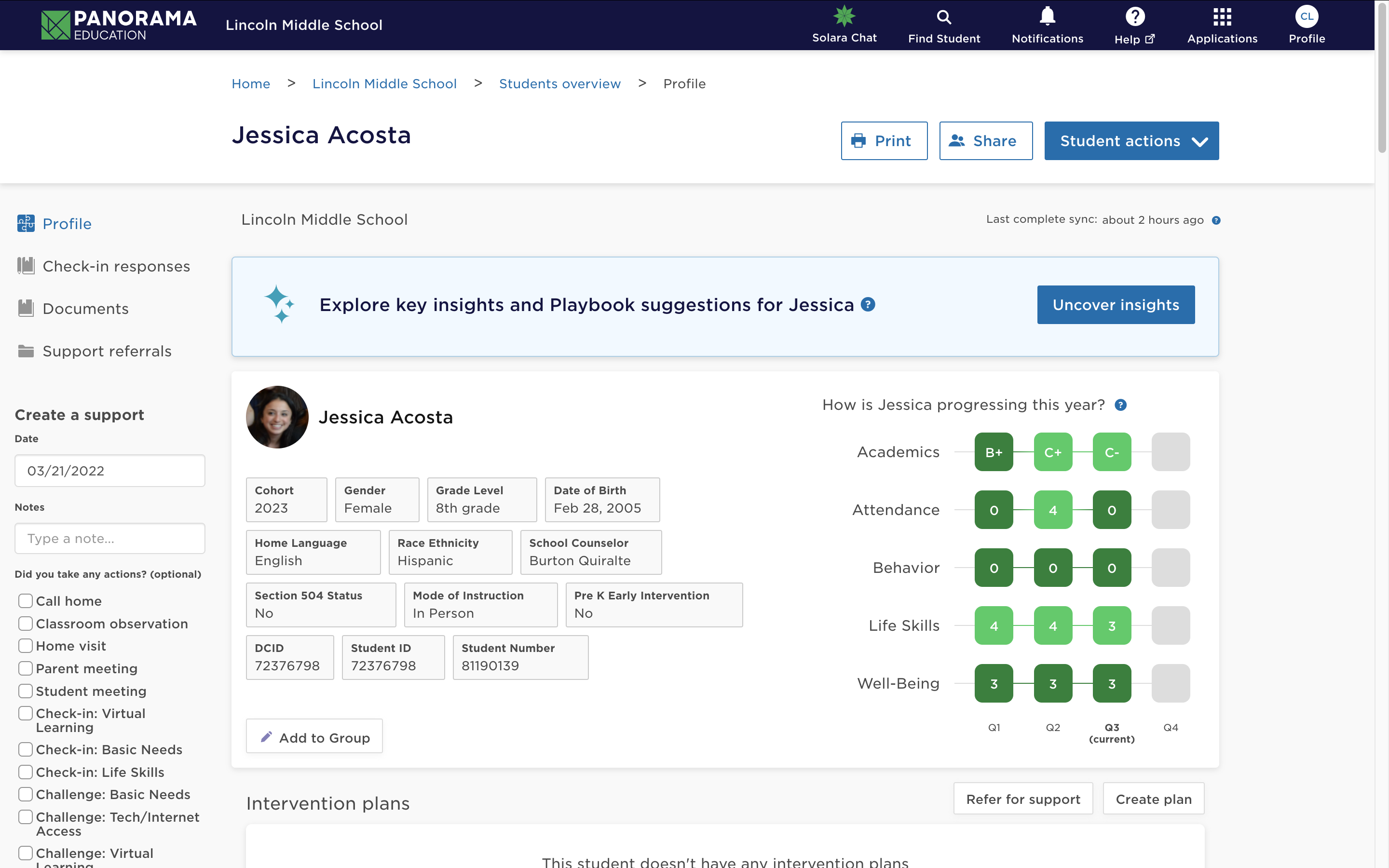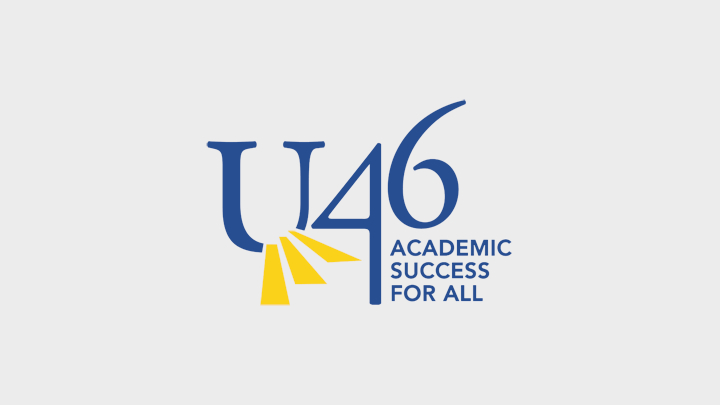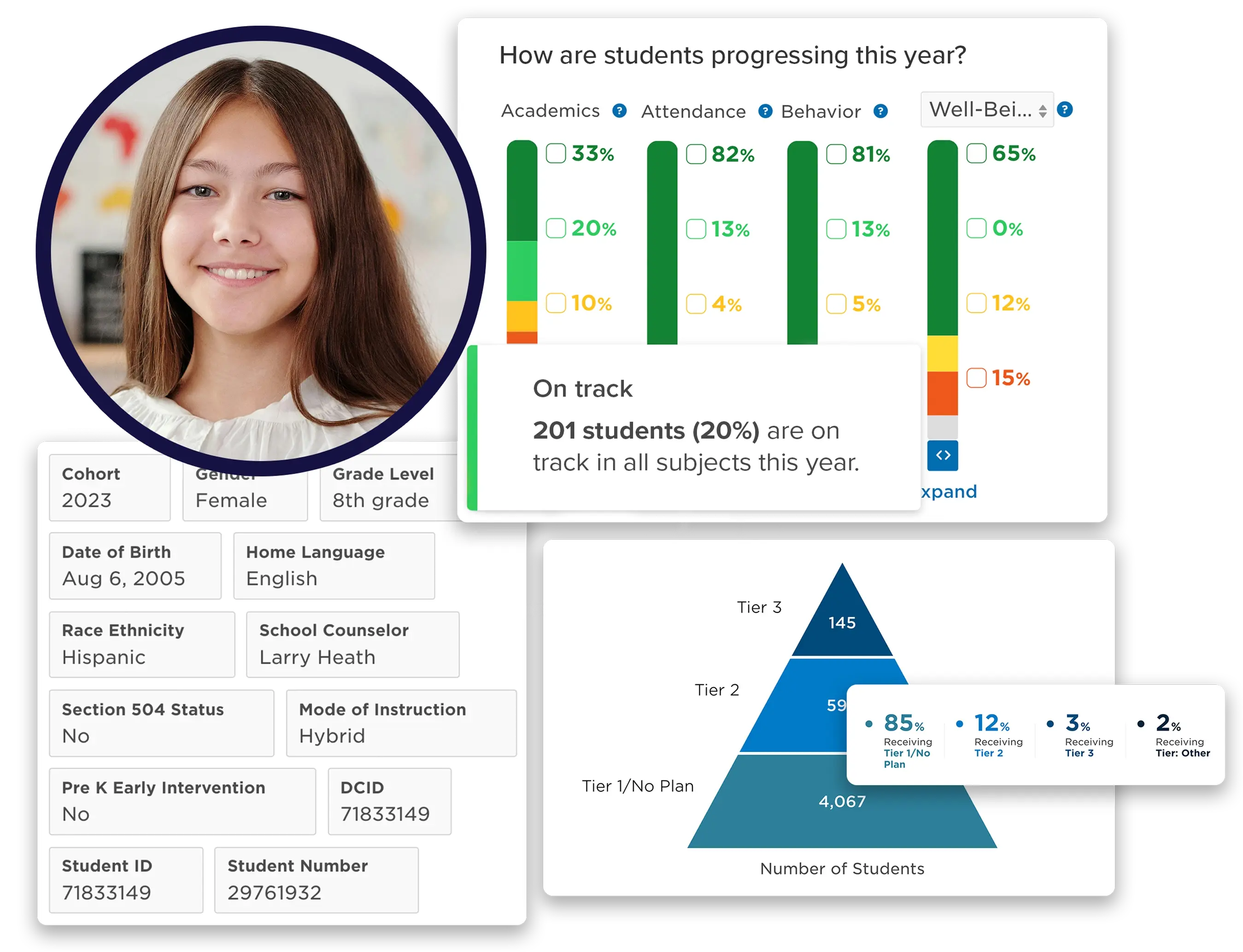Facing systemic disparities and fragmented systems, leaders from School District U-46—a district serving nearly 34,000 students in Illinois—knew that real student success would require more than just another tool. It would demand a cultural shift: a shared vision for MTSS grounded in data, consistent support structures, and empowered leadership at every level.
Partnering with Panorama Education, U-46 launched a transformative journey to unify its MTSS practices, build leadership capacity, and cultivate a districtwide culture of continuous learning and collaboration—all with an unwavering focus on helping every student thrive.
Challenges
- Fragmented data systems hindered holistic student support and decision-making.
- Inconsistent MTSS cycles and entry/exit criteria created inequities across schools.
- Leadership teams had a vision for MTSS but lacked the tools and processes to drive change.
- Under-resourced schools were labeled underperforming without systemic support.
Solution
Results
-
Through the pilot, U-46 was able to make intentional improvements to the MTSS framework and implementation model, positioning the district to be confident in a readiness to grow from 7 schools in 2024-25 to 29 schools in 2025-26.
- The percentage of students reading at grade level jumped from 8% to 34% in just two years.
- Empowered leaders and staff now engage in honest, data-driven conversations, and leadership teams own school improvement goals with clarity and consistency.
- Proactive, predictable MTSS practices now span 28 schools and counting.
- Adults collaborate more deeply, reflect more openly, and support students more systematically.
Challenges
School District U-46, one of the largest in Illinois with 55 schools spanning pre-K through 12+, faced critical challenges in implementing a strong, consistent multi-tiered system of supports (MTSS). Staff members struggled with fragmented data systems that made it difficult to triangulate information and identify root causes of student needs. Additionally, critical decisions often relied on outdated data or single metrics like grades, leading to missed opportunities for targeted support.
Implementation cycles for interventions varied wildly, with some schools using semester-long cycles, others quarterly or every 6–8 weeks. And these weren’t the only inconsistencies across the district: entry and exit criteria for interventions also lacked standardization, so a student qualifying for support at one school might not qualify at another.
For the Larkin Network, a cluster of nine historically underperforming schools with 3,700 students and 497 teachers, these systemic gaps were even more pronounced. Leaders had the vision and skills, but lacked the tools and streamlined processes necessary to drive systematic improvement. Frustrated by years of working to improve performance without real systemic support, leaders and educators were eager for change.
Solution
While the U-46 partnership with Panorama began in 2017 with Panorama Surveys and Engagement, their MTSS transformation started with a 2023 pilot of Panorama Student Success in the Larkin Network. The pilot was so successful in these nine schools that the district has since expanded Student Success to 29 additional schools.
The district started by establishing a shared vision for MTSS across its pilot schools. Leadership teams—including principals, assistant principals, specialists, and service staff—aligned on a common intervention calendar and consistent expectations. This helped bring predictability to intervention cycles to address longstanding inconsistencies across the district.
Implementation began with a phased approach. In the spring, Tier 2 and Tier 3 MTSS teams were trained to pilot the platform with small groups of students to get early feedback that would inform a districtwide rollout. Over the summer, leaders planned comprehensive professional development, offering both in-person and asynchronous options. If teachers elected not to attend the live PD, they were given coverage to finish the asynchronous training during their work day. This enabled every single staff member to complete training before the new intervention calendar launched in September.
|
|
U-46 emphasized that MTSS would be a shared responsibility across all staff—not just specialists. The district embedded Student Success into existing workflows, leadership teams, and professional learning communities (PLCs). Teachers took ownership of entering intervention plans, and leadership teams used dashboards to monitor school improvement goals. Real-time student profiles were relevant for cross-curricular teams and support staff, who could intervene proactively by triangulating grades, assessment results, attendance, and behavior data.
Ongoing coaching with Panorama was a critical driver of success. District and school leaders received consistent, job-embedded support to strengthen data literacy, coach their teams, and tie MTSS work directly to continuous improvement plans. Leaders became not just users of data but strategic drivers of systems change.
Panorama Student Success. Please note that demo data is pictured.
Results
The impact of the Panorama partnership has been transformational for U-46—not only in numbers, but also in culture. In just two years, the percentage of students in the Larkin Network reading at grade level jumped from 8% to 34%—a testament to systematic, data-informed interventions. This academic growth would have been nearly impossible without the district’s deliberate focus on leadership development, proactive MTSS structures, and honest data conversations.

Additionally, Student Success brought major breakthroughs in how U-46 educators work. Intervention plans became easier and faster to enter, increasing accuracy and allowing teams to act on real-time data. Teachers and leaders could quickly access a full picture of each student—including assessments, grades, attendance, and behavior data—all in one place. This holistic view made it easier to identify underlying root causes of challenges and match students with the right interventions, rather than relying on surface-level symptoms.
The platform also strengthened monitoring and accountability. Leadership teams could easily track intervention progress, use dashboard alerts to identify when support was needed, and engage service teams in coordinated conversations. Instead of interventions slipping through the cracks, schools now had clear structures for reviewing fidelity, progress monitoring, and next steps—streamlining what used to be a cumbersome, disjointed process.
|
–Sarah Rabe, Executive Director of Elementary Schools, Larkin Network, U-46 |
U-46 witnessed a tangible shift in how adults collaborate to support students. Leaders, coaches, and teachers across the network now engage regularly in purposeful data conversations, moving away from isolated decision-making and toward collective problem-solving. Deepening data literacy among principals and leadership teams has empowered them to coach more effectively across classrooms and committees.
Perhaps most significantly, U-46 leaders express genuine pride and excitement about the changes they are witnessing. Given this, U-46 is scaling Student Success to 29 additional schools, including all middle schools and three high schools in 2025-2026.
Ultimately, MTSS has become a collective commitment across schools where teachers, coaches, and administrators alike feel empowered to drive change. What began as a pilot for a few schools has grown into a movement about shifting how educators collaborate, reflect, and support students.




.png?width=772&height=506&name=student%20overview%20life%20skills%20(3).png)



